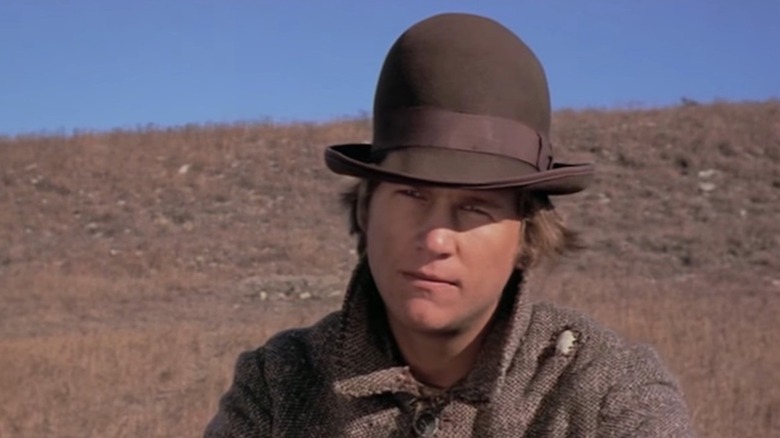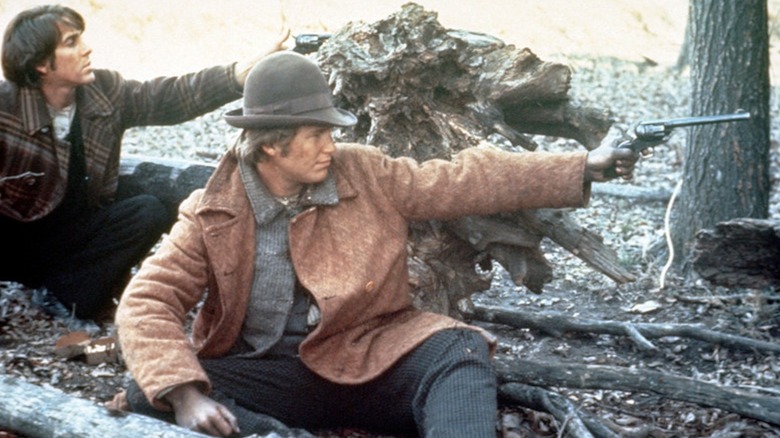Roger Ebert Once Praised This Forgotten Jeff Bridges Western For Its Charm
The New Hollywood movement of the late 1960s and 1970s gave talented young writers and directors to work unexpected variations on the medium's most tried-and-true genres. Just about every week brought something new and confounding to the nation's movie theaters (provided you lived in a big-ish city). As this cultural revolution raged throughout the tumultuous 1970s, the old guard of movie stars found themselves being replaced by the likes of Warren Beatty, Faye Dunaway, Jack Nicholson, Meryl Streep, and the late Robert Redford.
One actor who appeared destined for major movie stardom was Jeff Bridges; he possessed high-wattage sex appeal as Duane in Peter Bogdanovich's "The Last Picture Show," but the co-captain of his lousy high school football team is a deeply vulnerable young man with questionable prospects. There's something off about Duane, and this strange quality would apply to enliven most of Bridges' best performances.
Fresh off "The Last Picture Show," Bridges gave two of his finest performances in 1972. One was in John Huston's "Fat City," where he shone as Ernie Munger, a promising young boxer who, it's quickly clear, isn't going to pan out. The other arrived in "Bad Company," the directorial debut of Robert Benton (co-writer of "Bonnie and Clyde" and director of "Kramer vs. Kramer" and "Nobody's Fool"), where he challenged our sympathies as an opportunistic, incompetent young Western outlaw named Jake Rumsey. They're both rough, well-crafted gems, but "Fat City" is practically a canonical New Hollywood masterpiece by now. "Bad Company" doesn't get quite the same degree of respect (though Roger Ebert was an early admirer). Why has a revisionist Western still been considered a minor work?
Jeff Bridges is a gunslinging misfit in Bad Company
When Robert Benton died five months ago at the age of 92, I struggled to make sense of his career. He toyed with genre conventions early in his career with the subversive likes of "Bonnie and Clyde," "Bad Company," and "The Late Show," but then he got bitten by the prestige bug. "Kramer vs. Kramer," "Places in the Heart," and "Nobody's Fool" never felt explicitly like Oscar bait, but they were at least solidly made movies.
I kept going back to "Bad Company," expressively shot by the great Gordon Willis, and dominated by Bridges as a wannabe outlaw legend who's consistently undermined by his fresh-faced naivete. Jake isn't a young man to be feared; he's an in-over-his-head kid you clap behind the ear and tell him there's plenty of honest work out there for an able-bodied brat like him. Yes, Jake and his frenemy Drew (Barry Brown) have survived, but they're not vicious or calculating enough to last for long. By the conclusion of "Bad Company," that final freeze-frame shot in the Wells Fargo bank is like the end of "Butch Cassidy and the Sundance Kid" in reverse. They'll get the money, but it's hard to believe there won't be deputies lined up with shotguns as they try to make their getaway. These boys are dancing around the precipice of their graves. Maybe they'll get a shot or two off, but no one will spread their legend because there's no tale to tell. And that's why it's so cool Benton and Newman chose to make this funky outlaw classic.

